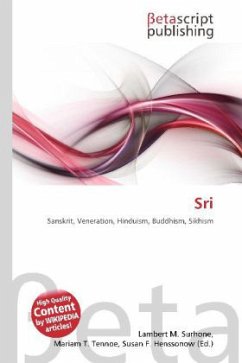
Sri
Versandkostenfrei!
Versandfertig in 6-10 Tagen
30,99 €
inkl. MwSt.

PAYBACK Punkte
15 °P sammeln!
Please note that the content of this book primarily consists of articles available from Wikipedia or other free sources online. Sri is a Sanskrit word, with a primary meaning of radiance, or diffusing light. It is often used as a title of veneration. In Sanskrit grammar, Sri has the feminine gender but nowadays it is used as a masculine name prefix, equivalent to ''Mister'' in English. It is gender-specific in Sanskrit, but the assumption that it is masculine has resulted in the titles of Shrimati (abbreviated Smt) for married women and Sushri for women (independent of marital status). Sri, al...
Please note that the content of this book primarily consists of articles available from Wikipedia or other free sources online. Sri is a Sanskrit word, with a primary meaning of radiance, or diffusing light. It is often used as a title of veneration. In Sanskrit grammar, Sri has the feminine gender but nowadays it is used as a masculine name prefix, equivalent to ''Mister'' in English. It is gender-specific in Sanskrit, but the assumption that it is masculine has resulted in the titles of Shrimati (abbreviated Smt) for married women and Sushri for women (independent of marital status). Sri, along with the forms Srimati and Susri, is often used by Hindus, Buddhists, Sikhs and Jains as a respectful affix to the names of celebrated or revered persons. There is a common practice of writing r as first word centralised in line at the beginning of a document. Another usage is as an emphatic compound (which can be used in multiple: sri sri, or sri sri sri, etc.) in princely styles, notably in Darbar Sri, Desai Shri, and Thakur Sri or as in Sri Sri Ravi Shankar, a Hindu spiritual Guru and leader.












